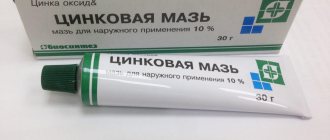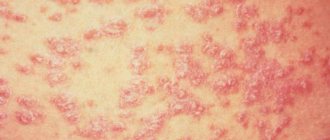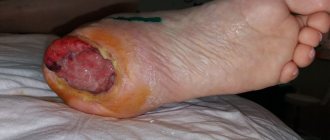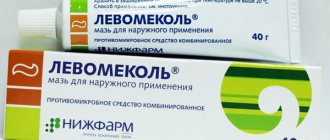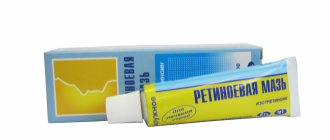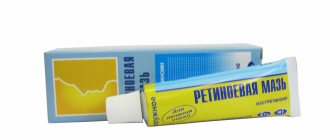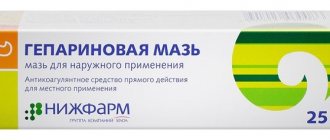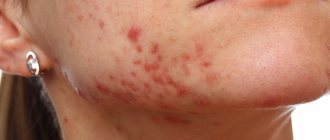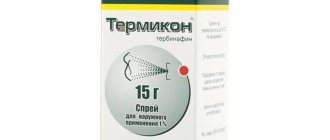Zinc ointment is one of the best remedies in the fight against diaper rash, excessive sweating and acne. It provides the necessary skin care, disinfecting and protecting from external adverse factors. The low price makes it accessible to consumers, and the low percentage of allergic reactions gives it the right to be called safe for babies.
How to use zinc ointment
Zinc ointment is used in pediatrics as a protective agent against diaper rash. In addition, it is recommended to lubricate the baby's delicate skin under the diaper every time after bathing. Zinc creates a reliable barrier that protects children's skin from constant contact with urine and loose stool. By applying zinc ointment to the buttocks daily, you can protect your baby from diaper dermatitis.
The disinfecting effect of the drug is used when treating wounds. By applying the composition to abrasions, you can avoid infection, prevent acidification of the damaged surface, and speed up the process of skin regeneration.
The main indications are:
- diaper rash;
- scratches;
- dermatitis;
- eczema;
- cuts.
In addition, zinc ointment is used to care for the elderly and immobile patients. Treatment of bedsores slows down their spread and disinfects, which eliminates the risk of secondary infections.
Composition and release form
The ointment is a white or slightly yellowish thick mass, packaged in aluminum tubes, polymer or glass bottles. Most manufacturers choose the first option for packaging the medicine, as it is the most convenient for the consumer. The patient can purchase a small tube of ointment (25 or 30 g), medium (50 g) or large (100 g) depending on the severity of the problem and the planned duration of treatment.
The main active ingredient of the drug is zinc oxide, its mass fraction in the total volume is 10%. Zinc is an essential biomineral contained in several hundred enzymes in the body. Zinc ointment uses its compound with oxygen, which has many healing properties.
Medical Vaseline is used as an auxiliary component. Thanks to its soft structure, the ointment is easily distributed over the surface of the epidermis. Vaseline balances the drying effect of zinc and prevents the skin from losing precious moisture.
Classic zinc ointment contains only the two indicated components. However, some pharmaceutical companies produce varieties of drugs that additionally contain menthol, retinol (vitamin A) and tocopherol (vitamin E).
How does zinc ointment work on acne?
Use in cosmetology has shown its effectiveness against acne. Skin rashes caused by excessive secretion from the sebaceous glands may disappear if zinc ointment is used correctly:
- Cleanse skin of makeup and impurities.
- Wipe skin dry.
- Apply zinc ointment to the area affected by acne.
- Leave overnight.
Zinc will dry out areas of the skin and prevent the sebaceous glands from producing sebum.
General description of the medication
Zinc ointment is one of the forms of the drug in which the main active substance is zinc oxide. In 100 gr. white substance contains 10 grams. zinc oxide and 90 gr. Vaseline. Due to the absence of hormonal substances and antibiotics in the composition, the product is considered safe and if it is used, an overdose is not possible. Zinc ointment for acne can be used during pregnancy and lactation.
Do I need to wash off zinc ointment from my face?
The constant presence of zinc on the skin of the face can lead to dryness and flaking. However, this depends on the individual characteristics of the sebaceous glands. If pathological activity is noted, the zinc ointment may not be washed off, but in this case there is no need to apply foundation and other cosmetics on top of it: firstly, this will clog the pores, and secondly, the compositions of some products may react with zinc, which may lead to chemical reactions between components.
If the ointment is not washed off during the day, be sure to cleanse the skin by washing before the next application. Otherwise, the accumulation of daytime dust in the pores with ointment residues can give rise to a new skin problem.
The main predisposing factors for the appearance of post-acne
- Severity of acne – acne of III and IV severity often leads to complications, because affect the deep layers of the skin.
- Individual skin characteristics, genetic predisposition - such as dark skin color, a tendency to increase melanin production at the slightest inflammation or damage to the skin.
- Lack of treatment, inappropriate treatment, or late treatment is when the process has been present in the skin for a long time and has affected deep tissues.
- Skin injuries during mechanical cleaning, i.e. when roughly squeezing out pimples.
The presence of at least one predisposing factor may be the cause of the development of post-acne.
Contraindications
The ointment is not used to treat skin diseases in patients prone to allergic reactions to the components of the drug.
Zinc ointment is not applied to the mucous membranes of the mouth. Once zinc enters the bloodstream through the esophagus, it can cause poisoning, which can lead to convulsions, allergic skin reactions, nausea, vomiting and dizziness. Exceptions may be the mucous membranes of the anal ring and foreskin, where the ointment can be applied to relieve the inflammatory process, accelerate the healing of cracks and disinfect the surface.
How to avoid age spots and scars
- Start acne treatment immediately. Even mild forms cannot be ignored - grade 0-2 acne, when there are single elements on the skin.
- Don't push! A banal but difficult point to implement. Skin cleansing can be done and sometimes even necessary, but it should be done carefully and competently by a cosmetologist.
- Use medications with anti-inflammatory effects. Not to be confused with antibacterial! Anti-inflammatory drugs have both preventive and therapeutic effects.
Recommendations follow from the previous paragraph - exclusion of predisposing factors.
How to use zinc ointment for sweat
Excessive sweating is a problem that zinc ointment helps combat. Violation of the function of thermoregulation leads to excessive production of sweat by the glands, due to which the body tries to reduce body temperature. Zinc ointment does not affect the center of thermoregulation, however, it can reduce the activity of the sweat glands, thereby reducing the amount of sweat produced.
It should be noted that the sweat produced by humans is odorless. The waste products of bacteria that multiply in the armpits, which contain a favorable environment for the proliferation of microorganisms, smell. Zinc ointment, having an antiseptic effect, reduces the rate of bacterial growth, thereby eliminating unpleasant odors.
Reasons for appearance
Human skin has a complex structure; in addition to the cells themselves, it contains hair follicles, sweat and sebaceous glands. If the functioning of the latter is disrupted, their ducts narrow, making it difficult for secretions to reach the surface. It accumulates inside the gland, creating ideal conditions for the proliferation of bacteria and the formation of inflammation.
Over time, swelling occurs in the area of the pimple, and collagen begins to be actively produced in this area. This means that denser tissue is formed, so patients’ requests often sound like this: “How to remove post-acne scars on the face?” The capillary network also grows and the work of pigment cells is stimulated. Darker stains are formed that are more durable.
Also factors that provoke the negative consequences of acne are:
- long-term fight against inflammation;
- unprofessional acne removal;
- the presence of nodules or cysts on the skin.
Persistent acne
Post-acne may be a consequence of this phenomenon, which cannot be dealt with for a long time. As a rule, to solve this problem it is recommended to do a hormone test.
The fact is that the receptors of the sebaceous glands, which are directly involved in the process of acne formation, are sensitive to male hormones, androgens (they are produced in the body of both women and men). An increase in their production also leads to a decrease in the content of linoleic acid in sebaceous secretions, and subsequently to the reliability of the skin’s protective barrier.
Such situations, and therefore prolonged inflammation on the surface of the epidermis, can be provoked by the following factors:
- puberty;
- endocrine diseases;
- obesity;
- menopause;
- gastrointestinal diseases;
- taking medications;
- stress;
- chronic fatigue syndrome, etc.
Mechanical damage to the skin
In order not to solve the problem of how to quickly get rid of post-acne scars forever and remove neoplasms, during the period of exacerbation of acne, it is recommended to avoid rough influence. Squeezing pimples, as well as mechanical damage (often resulting from careless care), leads to the formation of scars and age spots in this area. This is especially dangerous for people with dark skin, and also if the patient’s age exceeds 35 years. The peculiarities of the functioning of the endocrine glands during this period often lead to the formation of scars after acne and acne.
Mechanical injury to the face can also result from inaccurately performed cleaning or deep peeling. These procedures are not recommended during an exacerbation period.
Opinion against
Zinc ointment for acne, the use of which in dermatology is disputed, is not used as a monotherapy. This is explained by its low activity against bacteria that have penetrated the ducts of the sebaceous glands and caused acne and inflammation. Nevertheless, zinc is included in suspensions, mash and pastes, where, along with other active substances, it shows the best results.
To understand whether Zinc ointment helps with acne, you should remember the reasons for their appearance, namely:
- excessive sebum secretion;
- hyperkeratosis (thickening and proliferation of cells in the inner layer of the ducts of the sebaceous glands and hair follicles);
- acne bacteria;
- inflammation.
For acne to appear, all 4 factors must work. Sebum mixes with dead cells and forms a viscous mass that clogs the ducts of the sebaceous glands like a plug. Such an environment becomes very attractive for acne bacteria, which rush into these areas and, as a result of the body’s reaction to their vital activity, inflammation occurs - acne appears.
Hair follicles, where the ducts of the sebaceous glands exit, lie at an average depth of 2-4 mm. Zinc oxide is insoluble in water, which means it cannot decompose into ions that can penetrate deep into the skin, enter the area of inflammation and somehow affect hypersecretion and hyperkeratosis. This can only be done by zinc compounds based on hyaluronate, acetate dihydrate and sulfate, which are dissolved in various solvents. These compounds are included in such drugs as Curiosin, Klin AK and Zinerit, which have proven themselves quite well against acne.
If large areas of skin are affected by acne, all of them should be covered with the drug. In this case, zinc ointment for acne can have a completely opposite effect. Zinc dries, but the sebaceous glands perceive excessive dryness as a danger to the skin and begin to produce even more secretion to moisturize it, which provokes a worsening of the situation.
The product also does not have a detrimental effect on bacteria - one of the main links in the appearance of acne. It creates unfavorable living conditions for them on the surface of the skin, but cannot affect the living conditions in the formed comedones (plugs).
In conclusion
Zinc is a mineral that can be an effective natural remedy for treating mild to severe acne. It can fight inflammation and bacteria, regulate sebum production, and speed up cell turnover.
Zinc is available as a topical or oral treatment, but is usually used in conjunction with other more standard acne treatments such as AHA, BHA, benzoyl peroxide, resorcinol, retinol, or sulfur.
Talk to your doctor before starting treatment with any supplements to make sure you are not taking any medications that may interact with them.
Although topical zinc causes fewer side effects, it is not considered to be as effective for acne as oral zinc. If you are an adult taking a zinc supplement, do not exceed 40 mg per day.
If you are unsuccessfully struggling with acne, dermatologists at the Kyiv center “DellaRossa” can help you. Make an appointment to learn the best treatment strategies for you.
Post-acne therapy
No matter how effective the treatment is, acne always leaves traces. These may be pigmented spots or scarring of the skin. Good results from acne marks are demonstrated by two components together - salicylic acid and zinc oxide in the form of a paste. This is a combination drug in which zinc oxide dries, and salicylic acid acts as an antiseptic, anti-inflammatory component and keratolytic. Acid with a keratolytic effect softens the epidermis, causing it to peel.
Along with the horny scales, microorganisms are also partially removed from the surface of the skin. Therefore, the combination remedy is more useful for acne spots than for treating acne directly.
How to use
Your doctor will recommend either topical zinc or oral supplements; both are available over-the-counter (OTC). Both forms differ in recipe and method of use. And different types of zinc are absorbed and processed by the body differently.
Before you begin zinc treatment for acne, your dermatologist or doctor will likely evaluate your diet to determine whether you have a deficiency.
Topical zinc
For people who get a lot of zinc from their diet, their doctor will likely advise using topical zinc. Topical preparations are available in the form of gels, ointments and creams.
Topical zinc can be used in combination with alpha hydroxy acids (AHAs) and beta hydroxy acids (BHAs). It can also be used in a treatment plan along with other acne medications such as benzoyl peroxide, sulfur, retinol, or resorcinol. Combine acne products only under the supervision of a dermatologist.
Some topical zinc products should be used more often than others. Check the label before use. Your dermatologist may also recommend that you start slower and less often than the label suggests, so don't be shy about asking them.
Always test new topical products on a small area of skin before applying them to a larger area. Stop use and talk to your dermatologist if you experience skin irritation or signs of an allergic reaction.
Oral zinc
Zinc supplements are available in tablets, pills, and chewable forms. Oral zinc is used as is, in a multivitamin, or in combination with other nutrients and minerals.
Take supplements only under the supervision of a physician. Typically, the maximum dose for adolescents is 34 mg per day; adults up to 40 mg.
Actions provided
Zinc ointment helps against acne, according to users, due to the range of actions it has on the skin:
- eliminates inflammatory processes;
- dries;
- has a disinfecting effect;
- reduces pus secretion and irritation.
The antiseptic property of the oxide is not strong enough to suppress the development of bacteria that cause acne, which is why the instructions do not include such a disease in the list of indications.
When the substance is applied to an open abscess, it covers it with a film (has an astringent effect) and protects the wound from the penetration of microbes - this action is the anti-inflammatory property of the medication.
Zinc oxide is a powder substance with adsorbent properties, so it is able to absorb toxins produced during the life of bacteria and thus have a drying effect.
The Vaseline in the composition is responsible for ensuring that the resulting film remains on the wound for a long time.
Alternative options
If you choose, there are several other alternative vitamin and mineral supplements to combat acne. This includes:
● Aloe vera, a plant extract for topical use, available as a cream or gel; has antibacterial and anti-inflammatory effects and is rich in antioxidants.
● Vitamin A, an over-the-counter and prescription nutrient (retinol), promotes cell turnover and skin healing.
● Vitamin E, a nutrient that can be taken as a supplement or used as a topical treatment, strengthens the immune system and speeds up cell regeneration.
Your dermatologist can help you determine which treatment is best for your skin type and acne condition.
Efficiency: when will it help?
Dermatologists confirm that Zinc ointment for acne is effective due to a complex of properties beneficial for problem skin. Treatment takes varying amounts of time. The speed of recovery depends on the regularity of use, the severity of the disease and the accuracy of compliance with the following recommendations:
- Adding foods high in zinc to the diet - legumes, liver, nuts, chicken and quail eggs and avoiding foods containing copper and soy protein;
- Refusal of additional pharmaceutical creams and gels, especially those based on erythromycin.

